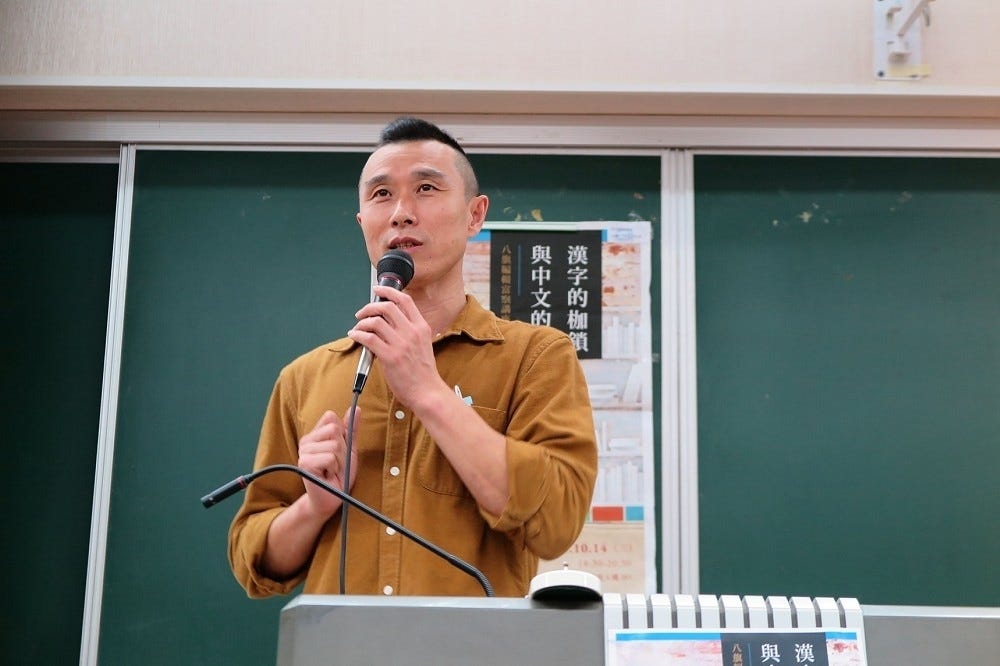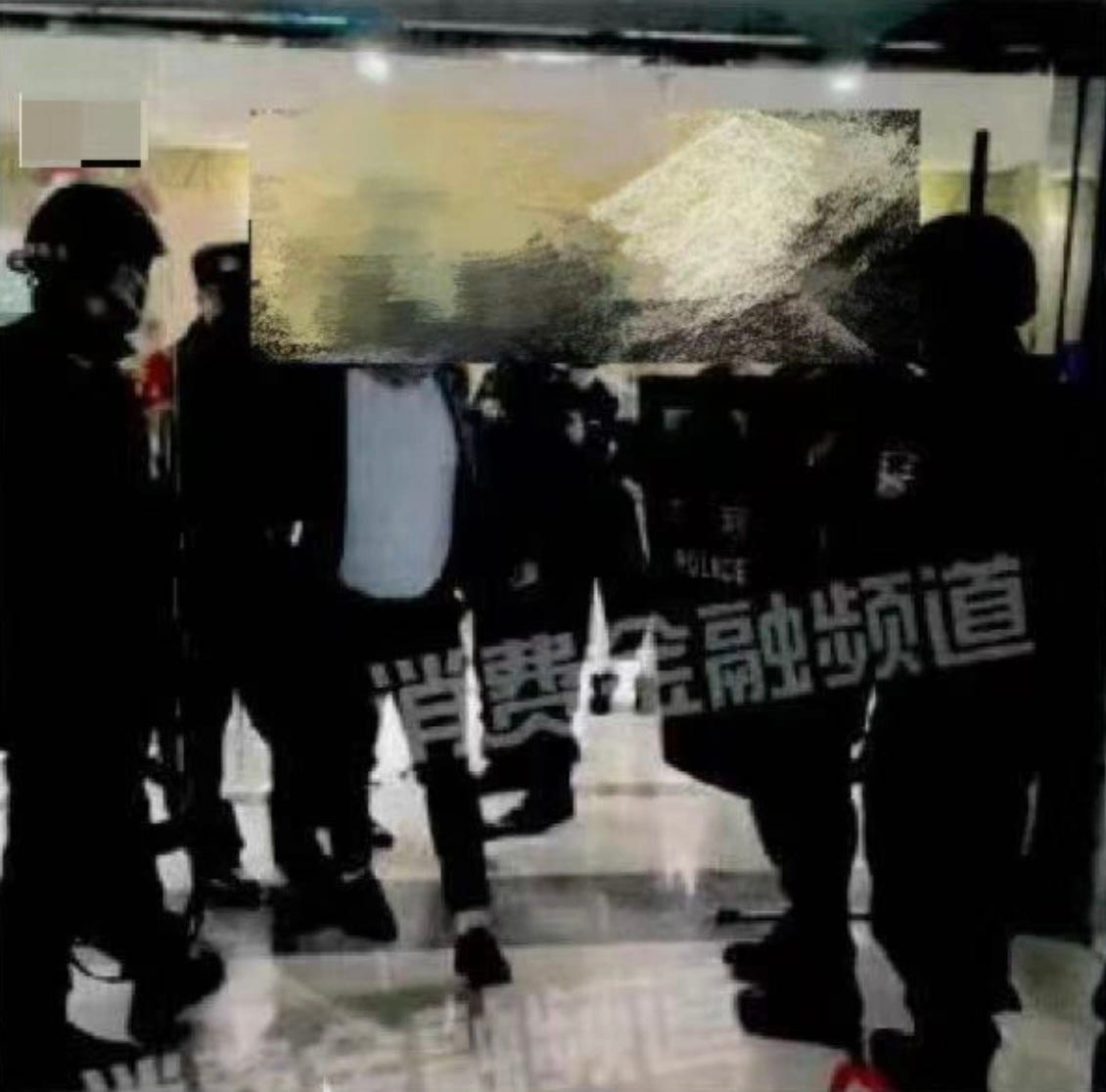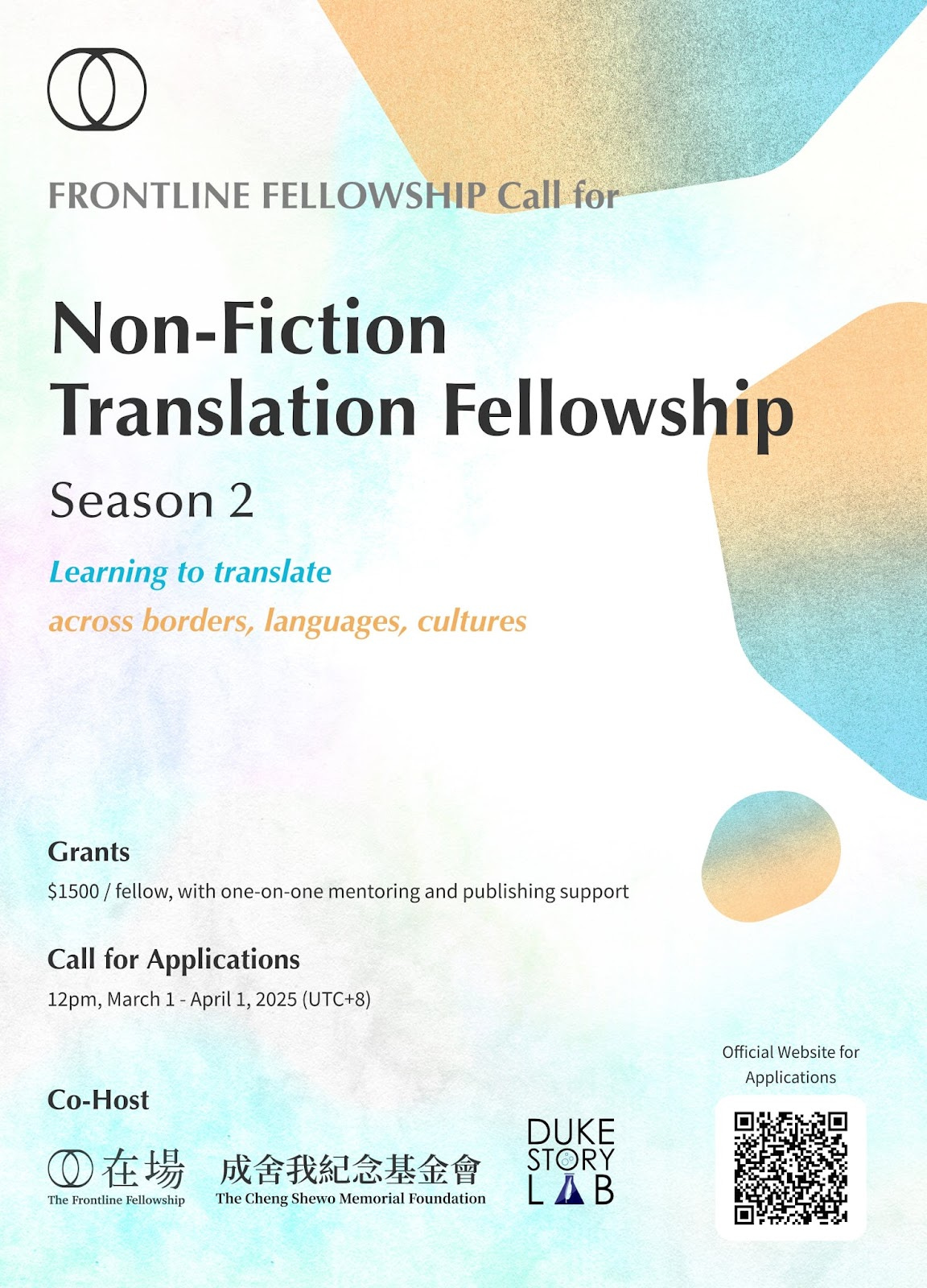Lingua Sinica Newsletter, 20 March
News, analysis, and commentary on Chinese-language media from the PRC and beyond.
Welcome back to Lingua Sinica.
Chinese state media have been popping the champagne ever since President Trump’s executive order last Friday dissolving the US Agency for Global Media (USAGM), which oversees Voice of America, Radio Free Asia and other media organizations that have operated — effectively but imperfectly — as mainstays of US public diplomacy for more than eight decades. For China’s leadership, which since the late 2000s has wrung its hands over the relative weakness of the country’s “discourse power” against that of the "US-led West" (美國為首的西方國家), watching the Trump administration gut American aid and alliances — and now public diplomacy — has been like watching a strategic competitor slit its own throat, as I told the New York Times (see also our “Regional Echoes” section below).

The sense of schadenfreude was captured well at Shanghai’s Guancha (观察者网) on Monday as former Global Times editor-in-chief Hu Xijin (胡锡进) gleefully summed up VOA’s deleterious past. "Almost all Chinese people know Voice of America because it is a symbolic tool for US ideological infiltration into China,” he wrote. “In the years when radio was prevalent, it repeatedly disrupted and incited Chinese society, playing a hugely negative role." Hu even recalled his experiences “during his student days,” adding how “harmful the influence of Voice of America was on Chinese university students, misleading everyone's understanding of the current situation." For its part, CGTN, China’s global broadcasting arm under the CCP’s Central Propaganda Department, played the story straight. Why not? What need for vicious innuendo when it was already provided so perfectly by Kari Lake, the Trump loyalist and conservative pundit promoted to “direct” VOA, who excoriated USAGM as "a giant rot and burden to the American taxpayer.”
However one might nitpick about the faults and foibles of services like VOA and Radio Free Asia, both have for decades produced strong reporting on China and the world, and both were held, transparently, to high standards of independence. Not least, RFA has done some of the most important work, epitomizing the excellence possible, on China’s persecution of its Uyghur population in Xinjiang. The sudden exodus from the profession of more than 1,000 journalists is a loss that will be felt deeply, and ever more apparently. Stay tuned to our growing Chinese-language outlet, Tian Jian (田間), for more soon on the impact of these decisions in Taiwan.
What will it mean for US public diplomacy? In these times of rapid, real-time disinformation, it can be instructive to turn quietly and cooly to history. Here are two points of past fact to consider. Let’s begin with Hu Xijin, who in a 2019 interview with the New York Times spoke nostalgically of the pro-democracy protests in China in the spring of 1989, at which time he recalled listening eagerly to American radio broadcasts. “It was like a flow of emotion,” he told the paper of record. “I felt full of hope that we could turn into a democratic country like the United States.” Over the years, meeting numerous Chinese journalists, I’ve heard this same story again and again from others who recalled tuning into VOA on their shortwave radios.
Moving on, we can wind back to a report produced in 1989 by the US Advisory Commission on Public Diplomacy, which noted that "VOA's coverage of the recent historic events in China and world reaction to them provided millions of Chinese listeners with accurate information not available from their state-run news media." The chairman behind that report, Edwin J. Fuelner, Jr., noted in his introduction that he and his colleagues wished to "make the case for continuing programs that are in the long-term best interests of the United States and China." As should be well known, Mr. Fuelner was a co-founder in 1973 of the Heritage Foundation, the same conservative think-tank that two years ago unveiled Project 2025, the plan to consolidate executive power and advance right-wing policies in anticipation of a Trump victory. These hairpin curves are jarring for many of us. But for China right now — they are probably exhilarating.
But enough from me. On to the stories. And don’t miss the call for non-fiction translators (with funding) at the end of the newsletter. Enjoy!
David L. Bandurski
CMP Executive Director
IN THE NEWS
Cross-Strait Publishing Perils
China's covert prosecution of Taiwanese publisher Li Yanhe raises serious questions about cross-strait pressures on freedom of speech.
In a troubling event highlighting the Chinese leadership’s ongoing attempts to pressure and suppress media and publishing circles in Taiwan, Li Yanhe (李彥和), the editor-in-chief of Taiwan's Gusa Publishing House (八旗文化) — who is also known by the pen name Fu Cha (富察) — has been convicted by a Chinese court of "inciting secession." The news, which broke through official channels on Monday this week, follows Li’s secret arrest in March 2023 on a trip to China to cancel his household registration. The publisher has remained in detention for the past two years, without further news of his case.
According to the DPP-leaning Liberty Times (自由時報), which broke the initial story, Li's incarceration appears to be directly related to his publishing activities, specifically publications that challenge "CCP historical perspectives" (違背中共史觀) and deviate from CCP narratives. Gusa frequently publishes books on subjects deemed sensitive by Beijing. One recent title, Xinjiang—70 Years of Domination under the People's Republic of China, examines what Japanese author Jun Kumakura calls "genocide with Chinese characteristics" in China’s northwestern Xinjiang region.
For the Taiwanese media outlet Up Media (上報), Li's arrest is clearly part of a broader pattern of persecution of voices challenging CCP narratives outside China’s borders. The article cites human rights worker Lee Ming-che (李明哲), himself a former detainee in China, who characterized the prosecution as blatant political manipulation by the Chinese authorities. According to Lee, the case follows a disturbing pattern whereby Chinese authorities classify cases like Li's as "major national security threats" and conduct "secret indictments" without disclosing specific charges publicly.
In a written reply to Taiwan’s Central News Agency (CNA), the Straits Exchange Foundation (海峽交流基金會), a Taiwanese government-funded civil organization under the supervision of the Mainland Affairs Council — Taiwan's cabinet-level agency responsible for policy regarding mainland China, Hong Kong, and Macau — stated that since the case began, they have "provided timely assistance in accordance with government instructions and respecting the wishes of the family." Since Li's detention in 2023, a Facebook page called Fu Cha Back Taiwan (富察回台灣) has actively advocated for his release, providing a platform for supporters to express solidarity and raise awareness.
REGIONAL ECHOES
Rewarding All Dictators
Responding to the news of the suspension of funding for US outlets VOA and RFA, Hong Kong exile media outlet Photon Media spoke to several journalists who fear a "humanitarian disaster" (人道災難) as a result of President Trump’s executive order. One RFA reporter, Amy (pseudonym), said colleagues were preparing for their "final day" of reporting for work. "Those on work visas from China, Xinjiang, Tibet, and Myanmar could be deported [from the United States] if they lose their jobs," she told Photon Media, which could place them in immediate danger. Journalists voiced concern too about returning to Hong Kong after being “named” (點名) by the city’s Security Bureau (保安局), fearing arrest under the national security law. RFA director Bay Fang (方貝) called the funding cut "a reward to dictators and authoritarian regimes" (對獨裁者和專制政權的獎勵).
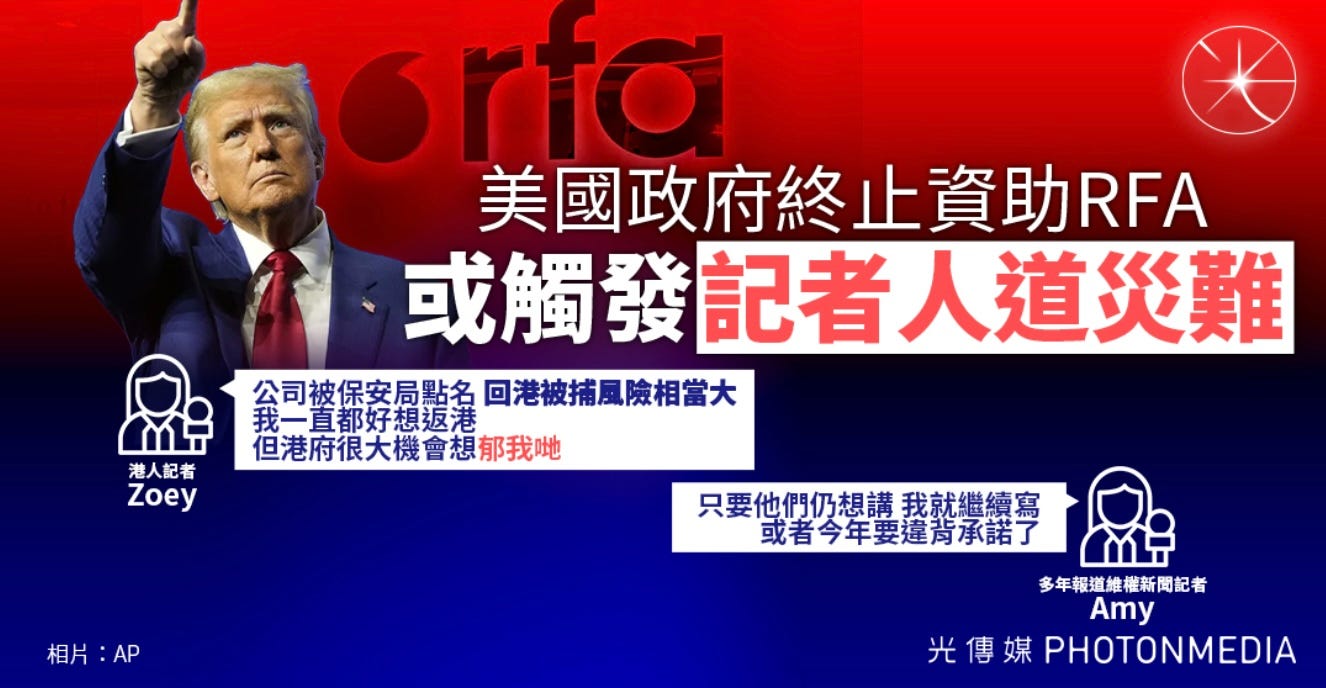
Meanwhile, at Taiwan's Up Media (上報), Lo Shih-hung (羅世宏), chairperson of the Taiwan Fact Check Center (TFC) and a professor of journalism at National Chung Cheng University, added his two cents on the crisis facing US-funded media outlets. "The Trump administration is attempting to bring VOA under political influence, with the 2025 executive order reducing USAGM operations to the legal minimum," he wrote. "These moves aren't simply fiscal considerations, but a major blow to American press freedom and international influence."
CMP HIGHLIGHTS
Don’t miss these key stories at the China Media Project and Lingua Sinica this week.
"China’s Campus Propaganda Pipeline" | Xi’an Jiaotong University partners with a state propaganda center to create a “talent pipeline” for China’s global messaging efforts — raising concerns about academic independence as universities become tools in Beijing’s international influence strategy. LEARN MORE.
"Survival Comes First" | A Gen Z content moderator working for a major Chinese internet platform reveals the moral contradictions of deleting sensitive political content while struggling to make ends meet. “We’re just tools,” he says in this candid interview from independent media outlet Mang Mang. Translation of this interview was done by CMP in cooperation with ChinaFile and China Digital Times. LEARN MORE.
"How Sino United Created a Publishing Monopoly" | One company tightly bound to the Chinese state has a stranglehold on publishing and bookselling in Hong Kong and is now making inroads into news media. LEARN MORE.
CROSSING LINES
When journalism becomes extortion: A cautionary tale of manipulation in China’s tightly controlled press environment.
In a stark illustration of media corruption in China, a prominent financial blogger named Kou (寇某), who ran a pair of prominent consumer-related social media channels, was sentenced on March 12 to more than 10 years in prison for "news extortion" (新闻敲诈). The case, which unfolded between 2022 and 2023, highlights a chronic problem in the country's controlled media environment. By fabricating false news stories about companies and threatening reputational damage, Kou systematically extorted more than 700,000 yuan by exploiting vulnerabilities of China's information ecosystem, according to a report by the Xinmin Evening News (新民晚报), a paper under Shanghai's state-run SMG.
The recent reporting stems from the completion of Kou’s legal case and ongoing efforts, officials say, to clean up the online information environment — serving as a warning to other potential offenders. The channels in question, "Consumer Financial Channel" (消费金融频道) and "Payment Encyclopedia" (支付百科), were previously included in a 2023 list of cautionary cases issued by the Cyberspace Administration of China (CAC), the country’s top internet control body. That list accused the channels of exploiting the principle of “public opinion supervision” (輿論監督) — a term associated with media monitoring and even investigative reporting — to commercially exploit companies.
What vulnerabilities in China’s information ecosystem did Kou exploit, exactly? One crucial underlying issue is Party-state control of the press, which has led to rent-seeking behavior by powerful state media journalists who can exploit their privileged position to threaten exposure of alleged malfeasance, demanding “hush money” (封口費) in exchange for their silence. Importantly, cases of news extortion over the past two decades in China have often implicated powerful state-run media as well as outright fraudsters. The most notorious example is the 2002 "Gold Nugget Case," where eleven reporters, including four from Xinhua News Agency, accepted cash and gold nuggets to cover up a mining explosion that killed 37 workers, highlighting the deep-rooted corruption within China's media landscape.
INTRUSIONS & INTERRUPTIONS
Tang Dynasty
Hong Kong’s security czar is riled — again and again — by the media. Why so sensitive?
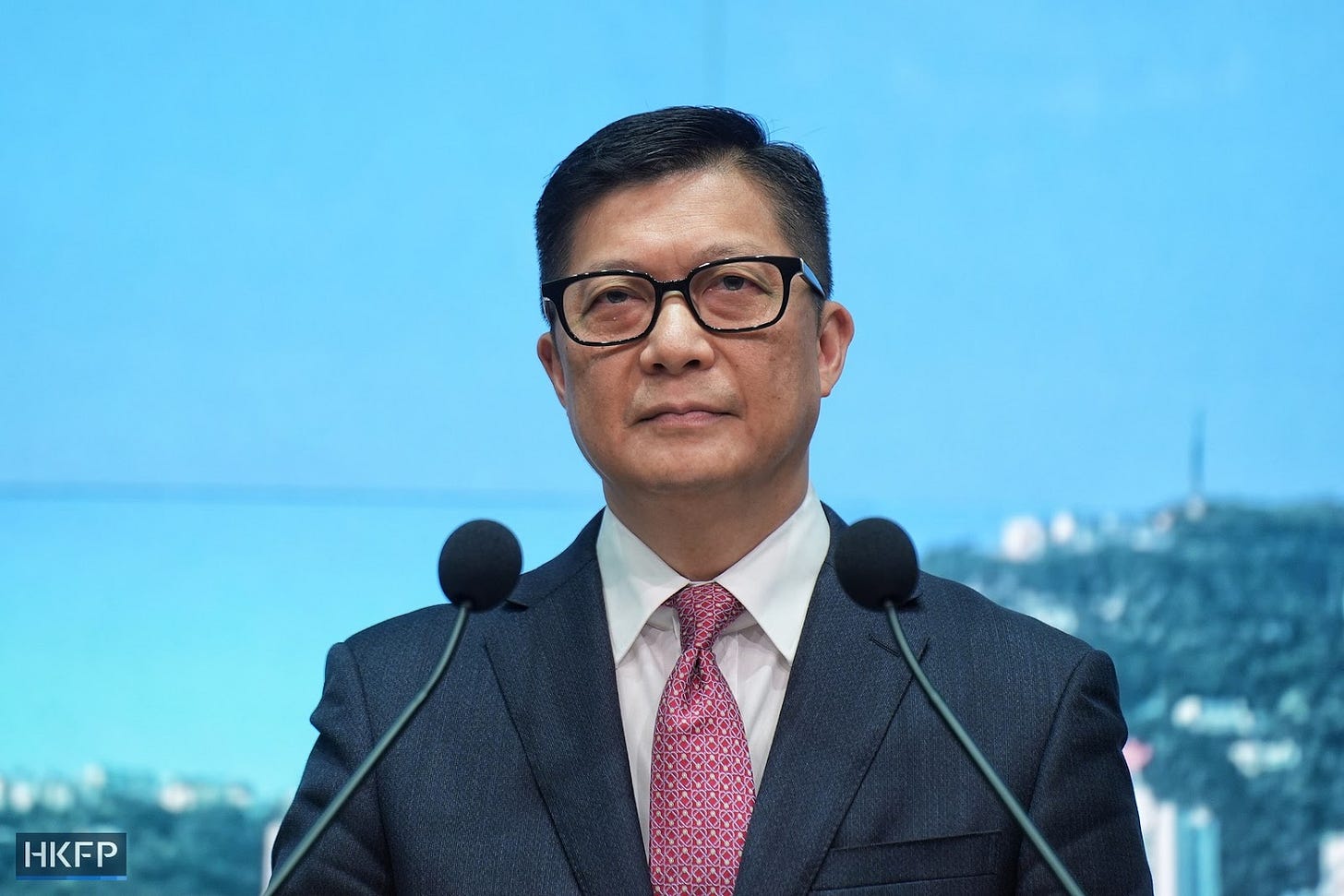
In his latest confrontation with local media, Hong Kong’s chief of security, Chris Tang (鄧炳強), railed against a reporter for the Ming Pao (明報) newspaper last week for “finding flaws in the government to undermine its credibility” after a question about an unannounced trip to Thailand — where Tang had joined a rescue mission for several Hong Kong residents held at a scam farm. It is general practice for such overseas trips to be published on the government gazette, which in this case was not done.
Tang’s latest media outburst came just a week after he fired off an accusatory letter to the Ming Pao condemning a commentary penned by legal scholar Johannes Chan (陳文敏), the former dean of the law school at the University of Hong Kong. Chan’s article, published on March 5, questioned the handling of the case against former opposition lawmaker Lam Cheuk-ting (林卓廷), who was given the toughest possible sentence by a District Court for his actions during the 2019 Yuen Long attack incident. Tang accused Chan of "disregarding facts" and attempting to "undermine public confidence in the courts" by suggesting the judiciary had focused disproportionately on protesters while downplaying violence by white-shirted attackers. In his rebuttal, Secretary Tang criticized Ming Pao for allowing itself, as he said, to be "used as a platform" for spreading divisive views. Tang’s constant broadsides against local media are a concerning sign of the times, likely intended to have a chilling effect on more outspoken voices.
CHAIN REACTIONS
Going Dutch
The Chinese-owned website DutchCN offers lifestyle content and community services for Chinese expatriates in the Netherlands.

In our line of work, we often stumble across media outlets abroad with links to China that are anything but organic. Just look at what happened when we scratched the surface of China-Arab TV, or when we recently looked under the hood of Hong Kong’s Sino United Publishing (SUP). So it’s a small pleasure to find a site with China backing that does not look like a Trojan Horse.
Since 2014, DutchCN (荷兰生活网), a Chinese online platform in the Netherlands, has served Chinese-speaking residents and expats looking to do commerce and connect with Dutch society. The digital platform is owned by Yaband Media (雅本传媒), the media arm of Yaband, a B2B company operating through Hong Kong since 2003 that set up a branch in the Netherlands in 2012 with what it calls “a diversified business profile around traditional telecommunication.” Yaband also operates YabandPay B.V., a Netherlands-based payment solutions platform for European companies that integrates China’s WeChat Pay, Alipay, UnionPay, and Quick Pass. As the company’s media division in the Netherlands, Yaband Media offers media and marketing services for Dutch businesses looking to access the Chinese market.
The DutchCN platform, which comprises a website, mobile app, and WeChat official account, provides news about the Netherlands, often in translation from local news sources, and tips on dining, transportation and other lifestyle information. With a decent level of engagement with its posts, the platform looks to be a useful resource for Chinese residents in the country, which number close to 100,000. DutchCN (荷兰生活网) also incorporates user-generated content, allowing users to register and post to a public bulletin board.
According to ICP registration records for DutchCN, the site is operated through Yabands China-based entity, Yaband Communication Technology Co., Ltd. (广州雅本通信科技有限公司), also registered in 2014 and based in the southern Chinese city of Guangzhou. The company’s top shareholder is Robin Chao Bai (柏超), Yaband’s general manager, with a 60 percent holding. The shareholders in the Hong Kong parent company are as follows, with no discernible connection to the official state media or government agencies.
AI WATCH
Fudan Downsizes Humanities for AI
Intelligence . . . it increasingly needs to be artificial.
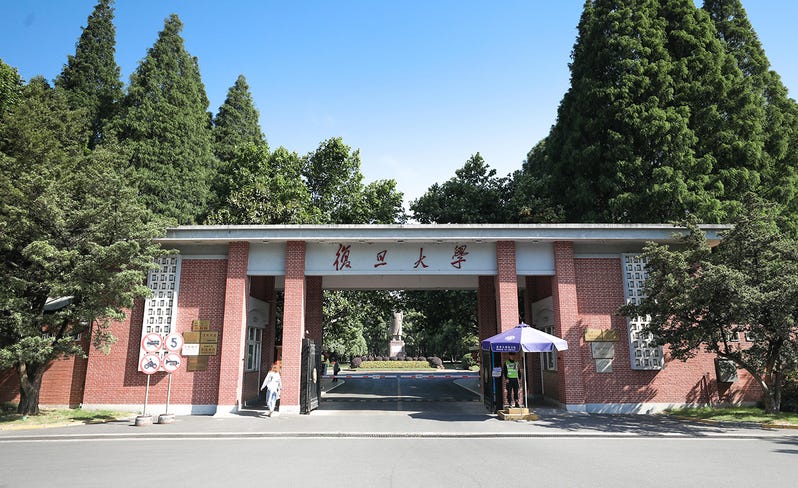
Shanghai’s Fudan University (复旦大学) is one of China’s most prestigious universities, with a raison d’etre unchanged, it claims, since the institution was founded in 1905: improving China’s position in the world through education. As artificial intelligence takes the world by storm — and becomes a crucial priority from top to bottom in China — the means of achieving that mission is changing, according to the university’s president, Jin Li (金力).
On February 25, Jin announced that Fudan would drastically reduce its course offerings in the humanities, instead focusing on AI training. In an interview with Guangzhou’s Southern Weekly (南方周末) on March 6, Jin said the university wanted to cultivate students that “can cope with the uncertainty of the future.” For Li, cutting the liberal arts cohort by as much as 20 percent is a social necessity. As he asked rhetorically in the interview: "How many liberal arts undergraduates will be needed in the current era?" (当前时代需要多少文科本科生?).
Read the full story at CMP.
SHORT STORIES
| China |
Swatting "Flies" on Consumer Day
Investigative reporting, which flourished to a limited but important extent in China in the early 2000s, has been severely constrained since around 2010, a trend worsening under Xi Jinping in the past decade. But March 15, World Consumer Rights Day, arrives each year as an opportunity for Chinese media to kid themselves into believing they still have teeth to sink into real journalism. This year brought the usual flurry of “swatting flies" (打蒼蠅) — a term for exposing low-level localized corruption and business malpractice. The Beijing News (新京報) published investigations on electric vehicle battery defects, AI fraud, and food safety violations at Yang's Braised Chicken Rice (杨铭宇黄焖鸡), a popular restaurant chain. On BiliBili's "Hot Chat" (趁熱聊聊) livestream, an undercover reporter warned people against ordering takeout before 11 AM, as restaurants routinely sell the previous day's canceled orders (stored at room temperature). Guangzhou’s Yangcheng Evening News chased down the story. The scandal prompted the State Council's Food Safety Office to issue a supervisory notice to authorities in Shandong and Henan provinces. Meanwhile, CCTV exposed the Woodpecker Home Repair platform (啄木鳥家庭維修) for systematically defrauding customers through phantom repairs and parts markup.
Time for Chinese consumers to ask: Why isn’t every day Consumer’s Day?
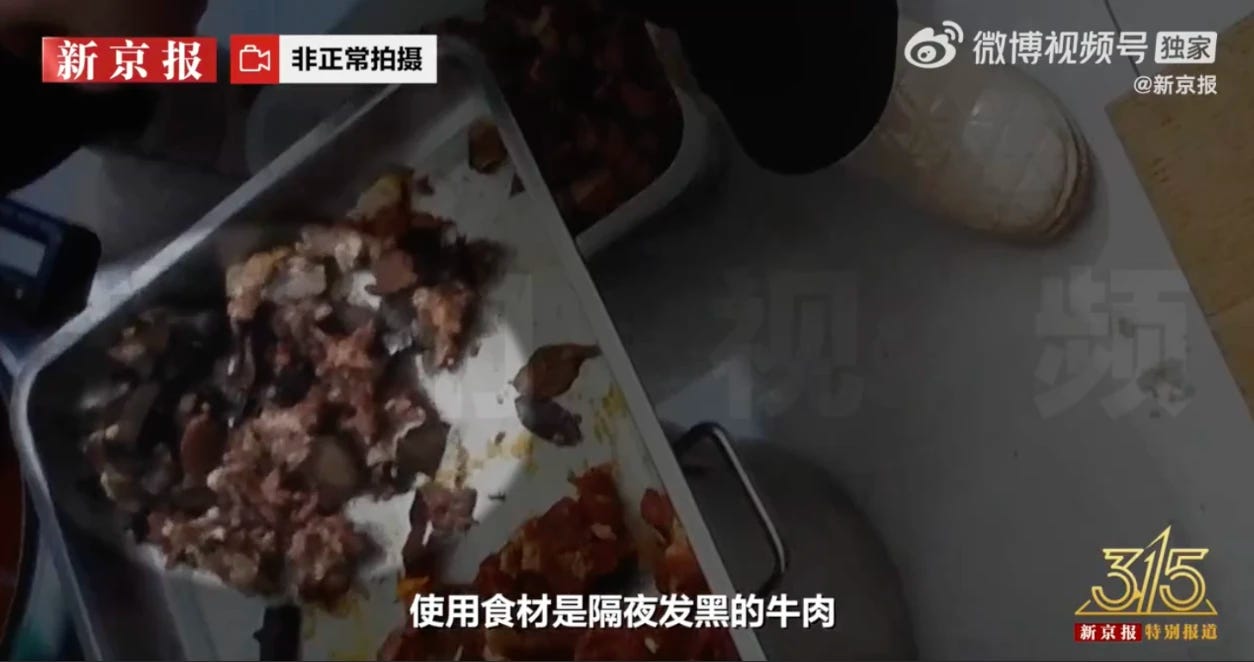
Beijing Mandates AI Content Labels
China's cyberspace regulators announced strict new rules requiring all AI-generated content to be clearly labeled, effective September 1. The "Measures for Labeling Artificial Intelligence-Generated Content" (人工智能生成合成内容标识办法), jointly issued by the Cyberspace Administration of China (CAC) and three other agencies, mandates both "explicit labels" visible to users and "implicit labels" embedded as metadata. "The measures aim to promote the healthy development of artificial intelligence, standardize AI-generated content labeling, protect the legitimate rights of citizens and organizations, and safeguard public interests," said a CAC official. According to new rules, providers must implement visible indicators on AI-generated text, images, audio, and video that could mislead the public.
| Taiwan |
Dream Interview Realized
A decade-long journey culminated for Taiwanese sports journalist Elaine Chang (張辰嬿) when she had an opportunity on March 14 to address MLB star Shohei Ohtani in Japanese during a pre-Opening Day press conference in Tokyo. Chang, who reportedly learned Japanese with the express goal of interviewing her idol, asked the star whether MLB games might come to Taiwan's new stadium. "It would be very suitable," Ohtani replied, sparking excitement among Taiwanese fans. Chang's path included studying Japanese from scratch to N1 proficiency (he highest level on a standardized exam for non-native speakers), attending games at Sapporo Dome, and visiting Angels Stadium in Anaheim, California, before becoming a sports reporter. While most reactions were positive, some critics questioned Chang’s choice of language, and fussed about the political implications — given Taiwan’s history of Japanese colonialism. "I wanted him to feel comfortable and leave a good impression of Taiwan," Chang explained, calling the moment "the day I achieved my dream."
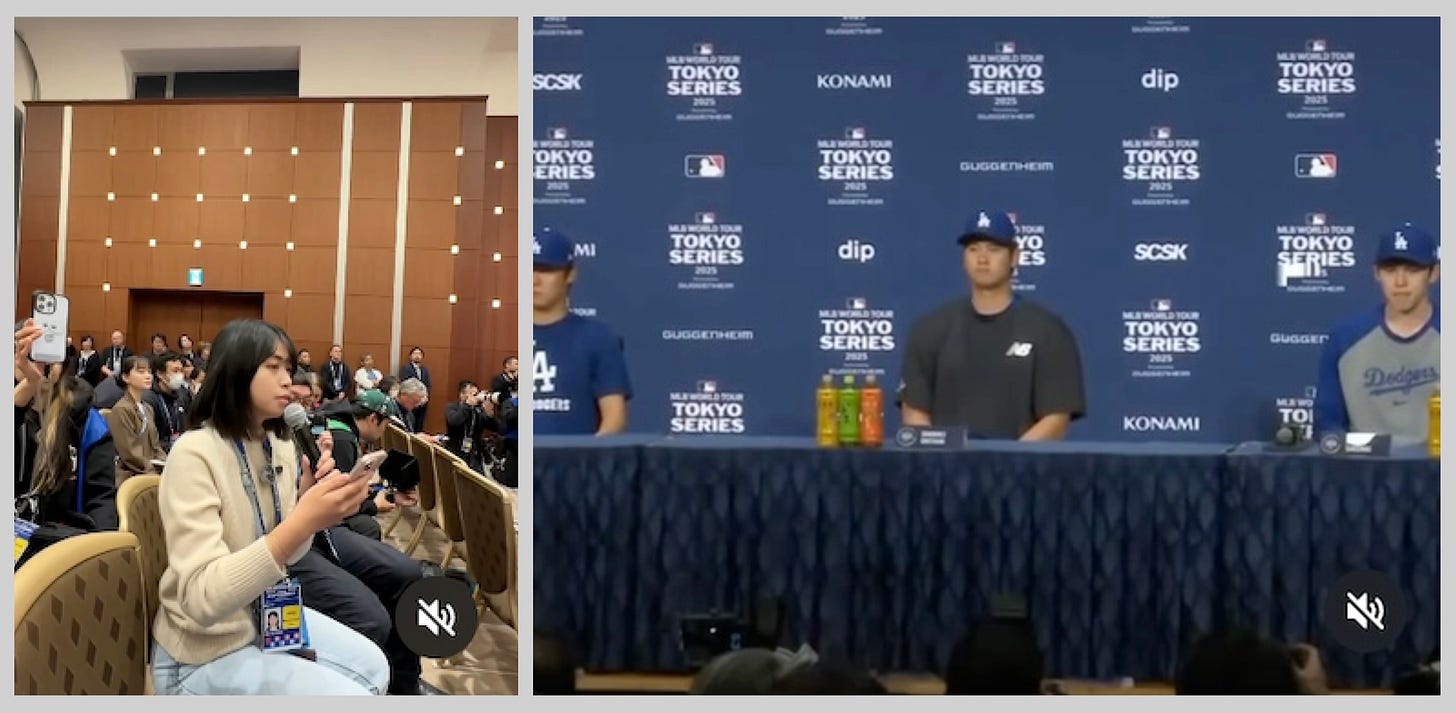
Newsroom to City Hall
Taipei Mayor Chiang Wan-an (蔣萬安) announced a cabinet reshuffle on March 16, with journalists stepping into key government positions — an embrace of media professionals with political expertise, and perhaps also a sense of political drama. Yu Hsiang (余祥), a 33-year-old political desk director with a decade of media experience at outlets including China Times, Apple Daily, and Central News Agency (CNA), was appointed Commissioner of the Department of Information and Tourism, becoming the country’s youngest serving cabinet member. Meanwhile, former broadcast journalist Wendy Wei (魏汶萱), 31, became deputy spokesperson alongside 29-year-old Tsai Wan-ying (蔡畹鎣). Wei previously served as politics desk chief at SET, and at CTi News, a network generally regarded as KMT-leaning and even pro-China. She made headlines in December last year when she confronted police while brandishing an electric cutter in an attempt to help her boyfriend, Hsieh Ke-yang (謝克洋) — an assistant to KMT Legislator Hsu Chiao-hsin (徐巧芯) — enter the Legislative Yuan during an especially contentious plenary session about constitutional procedures. Wei faced a tide of public criticism for her unprofessional conduct as a journalist, and was eventually disciplined by her network. Try the video below for a sobering taste from CTi News, Wei’s former employer, of just how sensational and, well, trashy, Taiwanese news coverage can be. This segment is about her new appointment.
Residency Revoked Over Unification Remarks
Taiwan's National Immigration Agency has revoked the residency permit of Chinese influencer Liu Zhenya (劉振亞), who advocated for "reunifying Taiwan through military force" on her channel "Yaya in Taiwan (亞亞在台灣) on Douyin. Liu, who held a marriage-based residency permit, is now barred from reapplying for five years, Taiwan’s CNA reports. Two other Chinese influencers — "En Qi" (恩綺) and "Xiao Wei" (小微) — face similar scrutiny for pro-unification content, with En Qi already completing an official interview and Xiao Wei summoned for questioning. Immigration officials cited "risks to national security and social stability" under cross-strait regulations. The case sparked heated discussion in Taiwan as China's government, despite systematic political controls enforced by the CCP, criticized Taiwan's decision as an infringement on free expression — a position most commentators rightly rejected as hypocritical. “Advocating for military unification is ultimately a call to dismantle Taiwan's freedom of speech,” wrote commentator Huang Wei-ping. “Speech that seeks to destroy free speech has no right to be protected.”
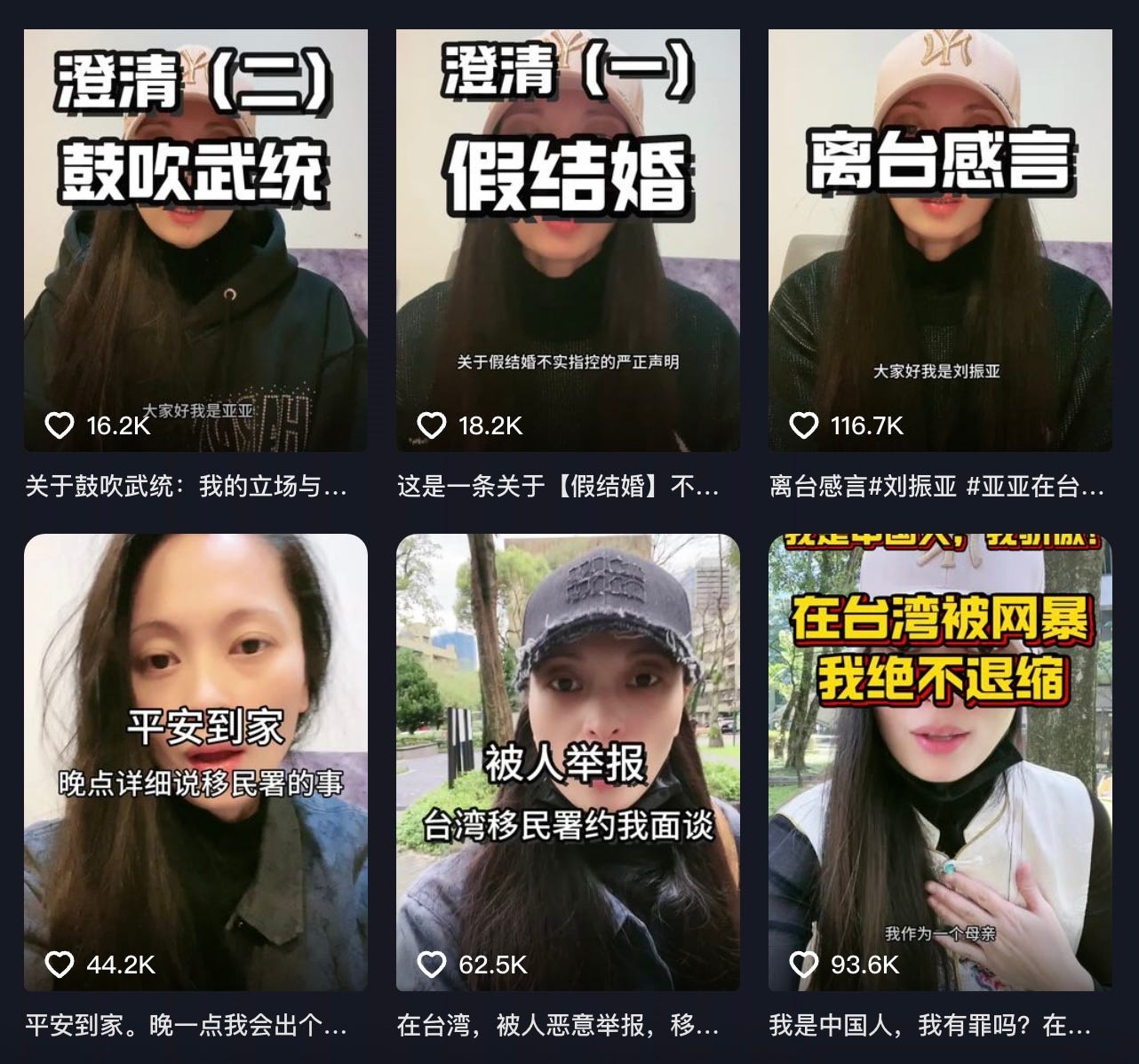
| Hong Kong |
Beijing Blasts Billionaire's Port Sale
Hong Kong's richest man Li Ka-shing (李嘉誠) faced mounting criticism from China this week after his CK Hutchison (長江和記) conglomerate announced plans to sell ports — including strategic Panama Canal terminals — to a US investment group led by BlackRock. The Ta Kung Pao (大公報), a pro-Beijing newspaper, published a barrage of articles over three days accusing Li of being "purely profit-driven, disregarding national interests and ethnic principles" and "betraying and selling out Chinese people" (背叛和出賣中國人). The articles were prominently republished on official websites of China's Hong Kong and Macau Affairs Office (港澳辦) and Central Liaison Office (中聯辦), signaling high-level displeasure. One commentary warned that "dancing with US politicians will earn historical condemnation," framing the transaction as American "hegemonic behavior disguised as commercial activity.” CK Hutchison maintains the deal is purely commercial and unrelated to recent political tensions over China’s presence in Panama.
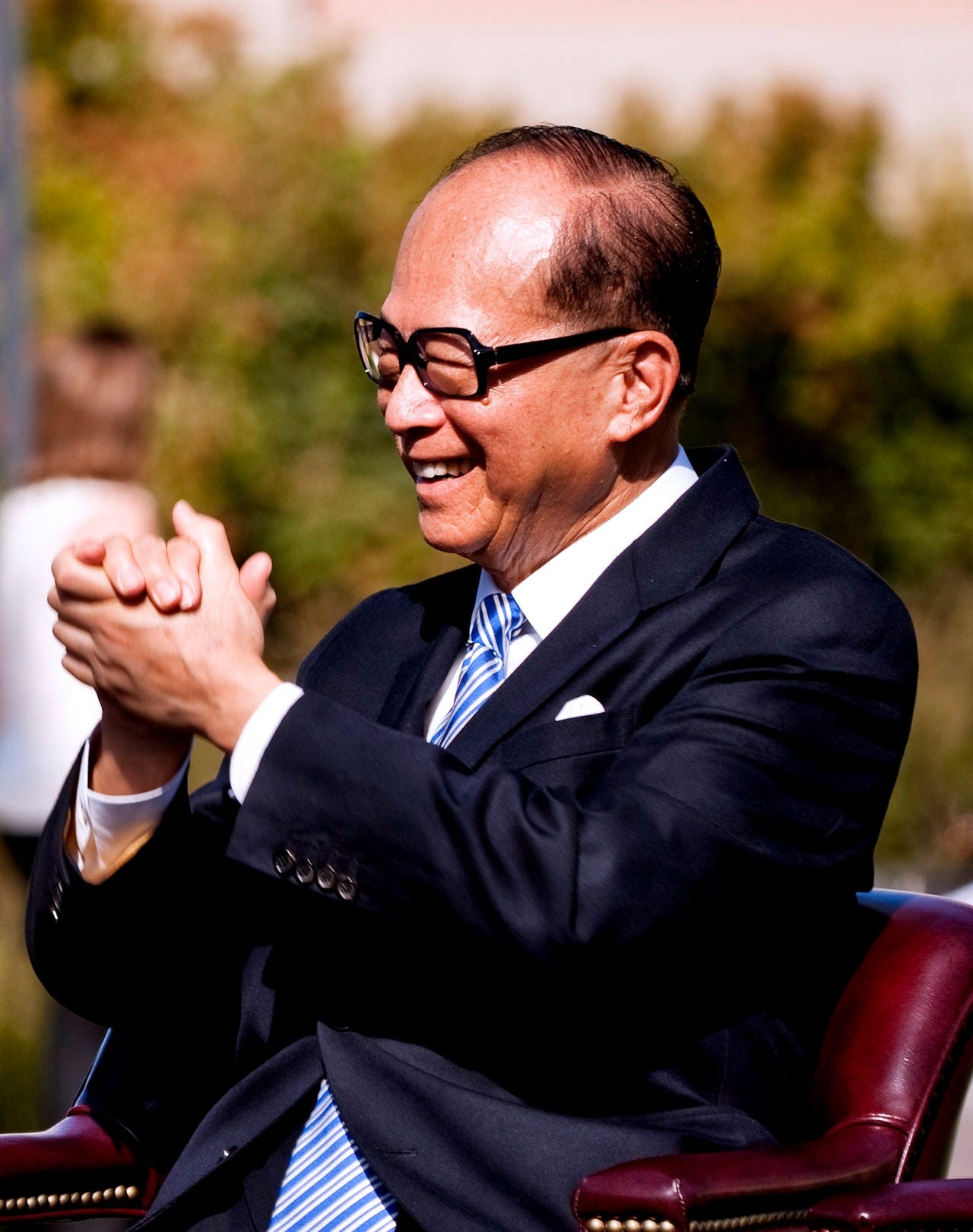
Fact-Check as Power Check
A survey of 1,006 Hong Kong residents revealed their priorities for fact-checking, according to Professor Francis Lee of the Chinese University of Hong Kong. The numeric ratings (on a 0-10 scale) show what information types residents believe most deserve verification:
Information with potential fraud: 8.22/10
Public health concerns: 8.00/10
Public safety issues: 7.73/10
Dubious government officials' claims: 7.42/10
Claims unfavorable to the government: 7.01/10
"The more power people and institutions have, the more their statements need careful verification," Lee wrote in Ming Pao this month. The survey revealed a significant generational divide: respondents aged 18-29 showed much stronger support for scrutinizing government claims than those over 50, highlighting different attitudes toward institutional accountability.
| Malaysia |
Media Self-Regulation Takes Root
After decades of debate, Malaysia's Media Council bill passes, marking a historic shift toward press self-regulation and reshaping public discourse. On February 26, Malaysia's parliament approved a long-awaited Media Council Bill, creating a framework for media self-regulation after 53 years of deliberation. The Senate passed the bill alongside amendments to the Malaysian National News Agency Act, The China Press (中國報) reported. Deputy Communications Minister Adeline Chang (張念群), who presented the bill, emphasized that the Media Council will approve its own code of conduct "without government intervention." The legislation aims to unify all media under a broader definition of "media organizations," moving beyond the outdated term "newspaper owners" established in 1967. Malaysian Press Institute Chairman Yong Soo Heong (翁書雄) called the development “historic” but warned the path forward remains challenging. “The core challenge is balancing press freedom with media responsibility,” Yong wrote in Nanyang Siang Pau (南洋商報), a Malaysian Chinese daily newspaper founded in 1923. In the same newspaper, Petaling Jaya MP Wong Liting (黃麗婷), special assistant to MP Lim Caikuang, said the law “will help reduce the spread of false information and regulate online speech, creating a safer exchange space for media.”
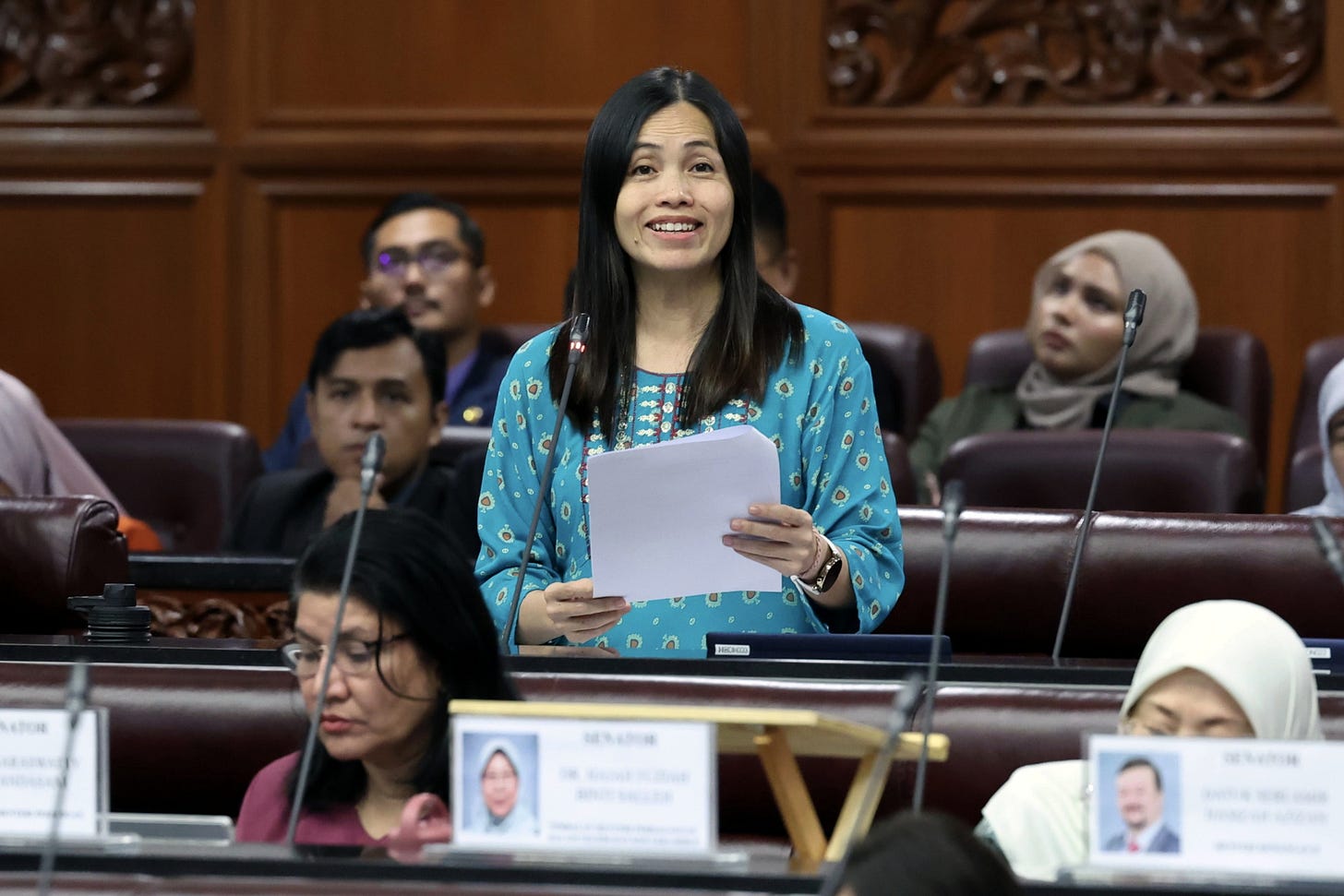
SPOTLIGHT
Stealth Immigrants
Taiwan welcomes immigrants to work and pay taxes, yet denies them full citizenship rights unless they abandon their original nationality, The News Lens reports.
In a revealing investigation by reporter Erya Hsue (許爾雅), The News Lens, an independent digital media based in Taiwan, examines the country's strict single-nationality policy preventing thousands of long-term foreign residents from becoming citizens in the country without renouncing their original nationality. The report is a must-read for understanding Taiwan’s challenges as it tries to remain competitive and globally engaged.
Despite housing nearly 950,000 foreign residents and 40,000 permanent residents, according to the report, Taiwan's government maintains that "our country follows the principle of single nationality, with dual nationality as the exception." This stance creates what American lawyer Michael Fahey, who has lived in Taiwan for over 30 years, calls "stealth immigrants" (隱形移民) — residents who contribute to society but lack political rights. "These 'stealth immigrants' ultimately aren't citizens. Ironically, Taiwan welcomes their labor and taxes, but they endure inconveniences in various subsidies, financial services, and daily life," Hsue writes.
"I'm Italian. I was born there, my family is there, I don't want to give up my Italian passport, it's part of what constitutes my identity," explains Matteo Serone from the Crossroads Association, an organization that advocates for immigration reform. The report highlights growing concerns that Taiwan's restrictive policy contradicts its need for talent amid demographic decline, and that it might eventually undermine its democratic values.
ANNOUNCEMENTS
Apply Now: Non-Fiction Translation Fellowship 2025
Calling all translators! Applications are open between March 1 and April 1 for any of you who wish to promote cultural understanding through translation. A collaboration between Cheng Shewo Memorial Fund, Duke Story Lab, and the Frontline Fellowship, the Non-Fiction Translation Fellowship offers financial support, mentorship, and publication assistance to translators working on Chinese-to-English non-fiction.
If you are not familiar with Frontline, one of the best programs out there supporting the work of non-fiction writers from China, check out some of their past work here.
The fellowship, which is open to all backgrounds and nationalities, focuses on translating not just language but cultural nuances. Apply through the Frontline Fellowship website or Facebook before 12:00 PM (GMT+8) on April 1.





